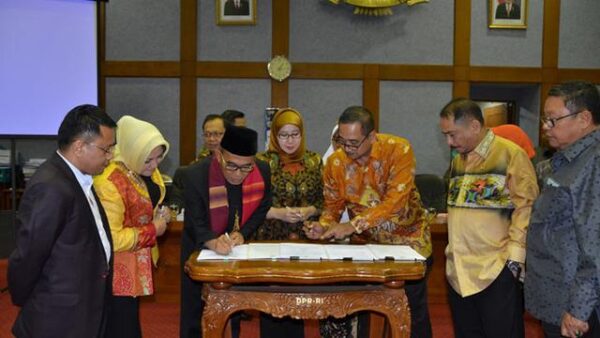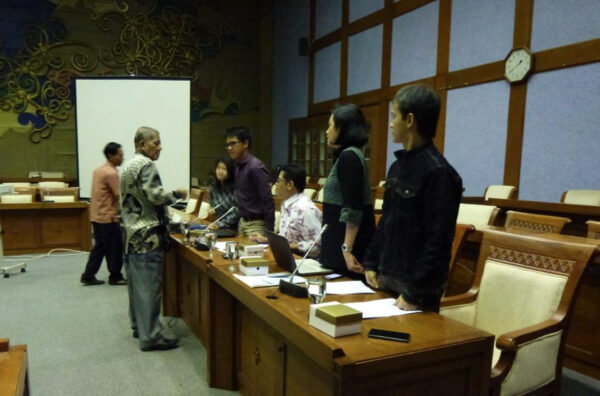
Indonesia’s Koalisi Seni
Feby Indirani
“The coalition was initially formed due to the concerns that many Indonesian artists and arts activists had about the legal draft of the law that was being circulated on the legislative agenda and were asking, “Who would voice the interests of the Indonesian arts world?”
Koalisi Seni (‘Arts Coalition’) is a non-profit organisation in South Jakarta that focuses on public policy in arts and culture. As of February 2022, they have 333 active members across Indonesia, which include arts communities, organisations and individuals. Their most significant achievement to date was advocating for The Law for the Advancement of Culture which was finally passed in 2017—35 years since the draft bill was first discussed in parliament. It is considered to be a revolutionary law for Indonesia on the subject of arts and culture. How did Koalisi Seni advocate this progressive law?
Strategies include:
-
Bottom-up processFrom 2010 to 2012, several arts organisations, communities and individuals from different parts of Indonesia formed a coalition. They frequently held focus group discussions to draw upon aspirations and inputs for creating strategic goals to push for advocacy on the draft bill.
-
Legal analysisPreviously, most artists and arts communities responded to the proposed law without sufficient knowledge of the legal aspects. To rectify this, Koalisi Seni conducted more in-depth research on the draft bill from 2012 to 2015
-
Keep your government
Koalisi Seni worked closely with parliament to refine and revise the draft bill. They held regular discussions with the Indonesian parliament tasked to produce the draft bill in 2015 to 2017.
-
Keeping the agendaKoalisi Seni know there is still much work to be done. After the Law was officially regulated in 2017, they continued to oversee its implementation of its derivative regulations. To keep the agenda alive, Koalisi Seni continues to advocate for arts and culture by carrying out various initiatives to encourage better policies, funding and tax incentives.
When The Law for the Advancement of Culture (2017) was passed, it became an umbrella legislation for legal protection and freedom of cultural expression in Indonesia. This law was to ensure not only the rights of the general population to freedom of cultural expression and protection, but also those in minority and marginalised groups in Indonesia, such as the Ahmadiyya community, indigenous people and LGBTQ communities, who continue to experience intolerance, discrimination and persecution in the community.

Tao Silalahi Arts Festival at Toba Lake, North Sumatera (April, 2019). The festival is held annually by Rumah Karya Indonesia, one of the members of Koalisi Seni. Photo credit: Rumah Karya Indonesia.
Bottom-up process
Hafez Gumay, Koalisi Seni’s Advocacy Manager, explained that the coalition was initially formed due to the concerns that many Indonesian artists and arts activists had about the legal draft of the law that was being circulated on the legislative agenda and were asking, “Who would voice the interests of the Indonesian arts world?” To further explore this concern, Koalisi Seni held frequent focus group discussions to draw upon aspirations and inputs from various groups and individuals in the arts sector.
On 3 May 2012, Koalisi Seni was officially established to represent the arts sector, with a commitment to bring about better artistic developments. The management and supervisors were elected, then Koalisi Seni recruited researchers to map arts communities in several Indonesian cities to compile a database and document their problems.
Legal analysis
With the support from the Indonesian Centre of Law and Policy Studies (PSHK), Koalisi Seni was able to analyse the draft bill more effectively and provide regular input to the legislative. The legal analysis helped individual artists, arts communities and organisations in Indonesia to stand their ground and protect their needs. Koalisi Seni also run a series of public discussions to introduce the legal analysis of the draft bill to the arts communities. To further develop their legal knowledge, Koalisi Seni formed a small team of legal analysts and cultural experts who act as ministry consultants. This team has become the representative team for meeting with the government for the draft bill and arts and cultural issues in general.
Keep your government close
By dedicating two years of intensive and almost weekly meetings and lobbying, Koalisi Seni established a partnership with the ministry and the legislative. The draft bill was finally formalised as The Law for the Advancement of Culture in 2017.
One of the key figures in the arts advocacy movement, Hilmar Farid, a historian and activist, decided to jump on the government bandwagon and was appointed as the Director General of Culture at the Ministry of Education, Culture, Research and Technology in 2015, a position he still holds to date. His appointment was highly celebrated and integral to the draft bill being moved forward.

Parliamentary agreement in first preparation for the ratification of The Law for the Advancement of Culture. Photo credit: Parliament Secretary.

The Koalisi Seni team at one of their weekly meetings with Commission X in Indonesia’s House of Representatives. Photo credit: Koalisi Seni.
Keeping the agenda alive
Despite the Law being passed in 2017, the process of implementing the derivative regulations nationally and locally has been slow and complex. Koalisi Seni run three main initiatives to keep the agenda alive:
(1) National budget – Advocate for a national budget for arts and culture based on the issues faced by local arts organisations and communities. Koalisi Seni actively engage with arts groups and communities in several provinces in Indonesia to document the arts and cultural issues in their areas which are relevant under the application of the Law.
(2) Cultural Endowment Fund – Advocate for the national endowment fund for the arts as mandated in The Law for the Advancement of Culture. This endowment for the arts kicked off in 2021 but is yet to come into fruition. It focuses on the arts activities of women, other marginalised groups and those in the outer and remote areas of Indonesia. The concept and breakdowns of the endowment were actively advocated by Koalisi Seni through a series of focus group discussions and consultations with experts and artists.
(3) Website updates on the Law – Koalisi Seni hosts an informative website to monitor the implementation of the Law (pemajuankebudayaan.id) and provide updates and resources to the public. They also hold an annual program about the Law to keep the agenda alive and continue with their efforts of advocating for better policies, funding and tax incentives for the arts sector.
Feby Indirani
| Feby Indirani is an author and a content writer. Her works mainly focus on women and other minority groups. Her fiction stories have been translated into English, Italy, Germany and Japan and were appreciated by international media and academics. She initiated a campaign, Relax, It’s Just Religion to promote freedom of religion in Indonesia through arts and activism. She was a fellow of the Australia-Indonesia Muslim Exchange Program in 2006 and got her MA in Digital Media from University College London in 2019, sponsored by the Chevening scholarship. |
What is the Imagine Around the World Project?
A partnership with the British Council Australia, the Imagine Around The World Project aims to document case studies from numerous countries outside of US, UK, Canada, Australia and New Zealand to share best practice and leadership in cultural diversity, cultural equity and inclusion in the arts, screen and creative sectors. This project is managed by Diversity Arts Australia and supported by Creative Equity Toolkit partner, British Council Australia. To find out more click below – or read the other case studies as they go live here.

